Philosophical Thought on Rashomon: Plato, Machiavelli, Truth, and Ego
VerifiedAdded on 2023/06/12
|5
|1332
|176
Essay
AI Summary
This essay provides a reflective analysis of Akira Kurosawa's film Rashomon, exploring its philosophical implications through the lenses of Plato and Machiavelli. It delves into the film's depiction of subjective truth, the distortion of reality by ego, and the inherent flaws in human nature. The analysis highlights the woodcutter's role as a Platonic hero for confessing his flaws and rising above ego, while also examining how the characters' self-interest and possessiveness align with Machiavelli's cynical view of humanity. The essay concludes that understanding the film through these philosophical frameworks offers a deeper appreciation of its complex themes and philosophical premise.
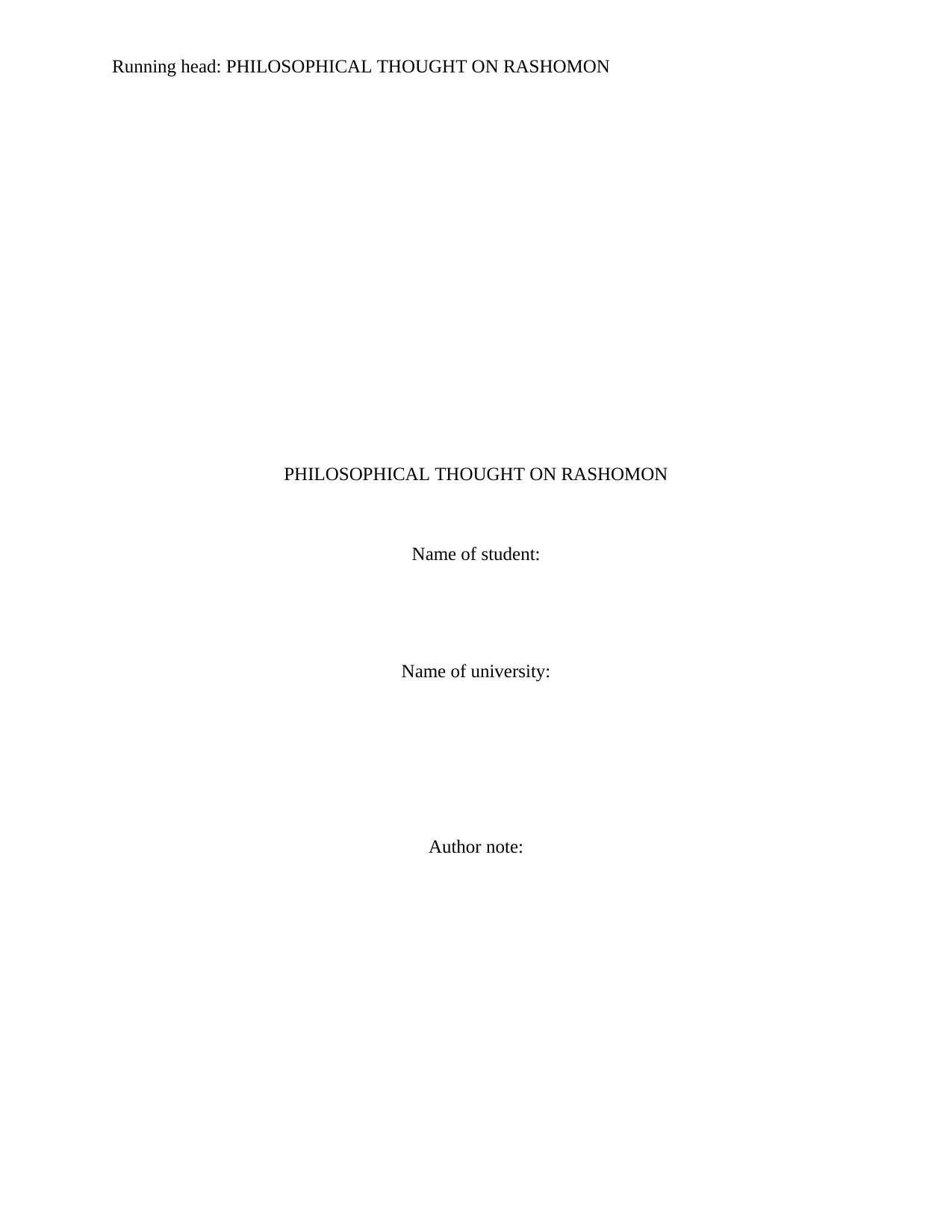
Running head: PHILOSOPHICAL THOUGHT ON RASHOMON
PHILOSOPHICAL THOUGHT ON RASHOMON
Name of student:
Name of university:
Author note:
PHILOSOPHICAL THOUGHT ON RASHOMON
Name of student:
Name of university:
Author note:
Paraphrase This Document
Need a fresh take? Get an instant paraphrase of this document with our AI Paraphraser
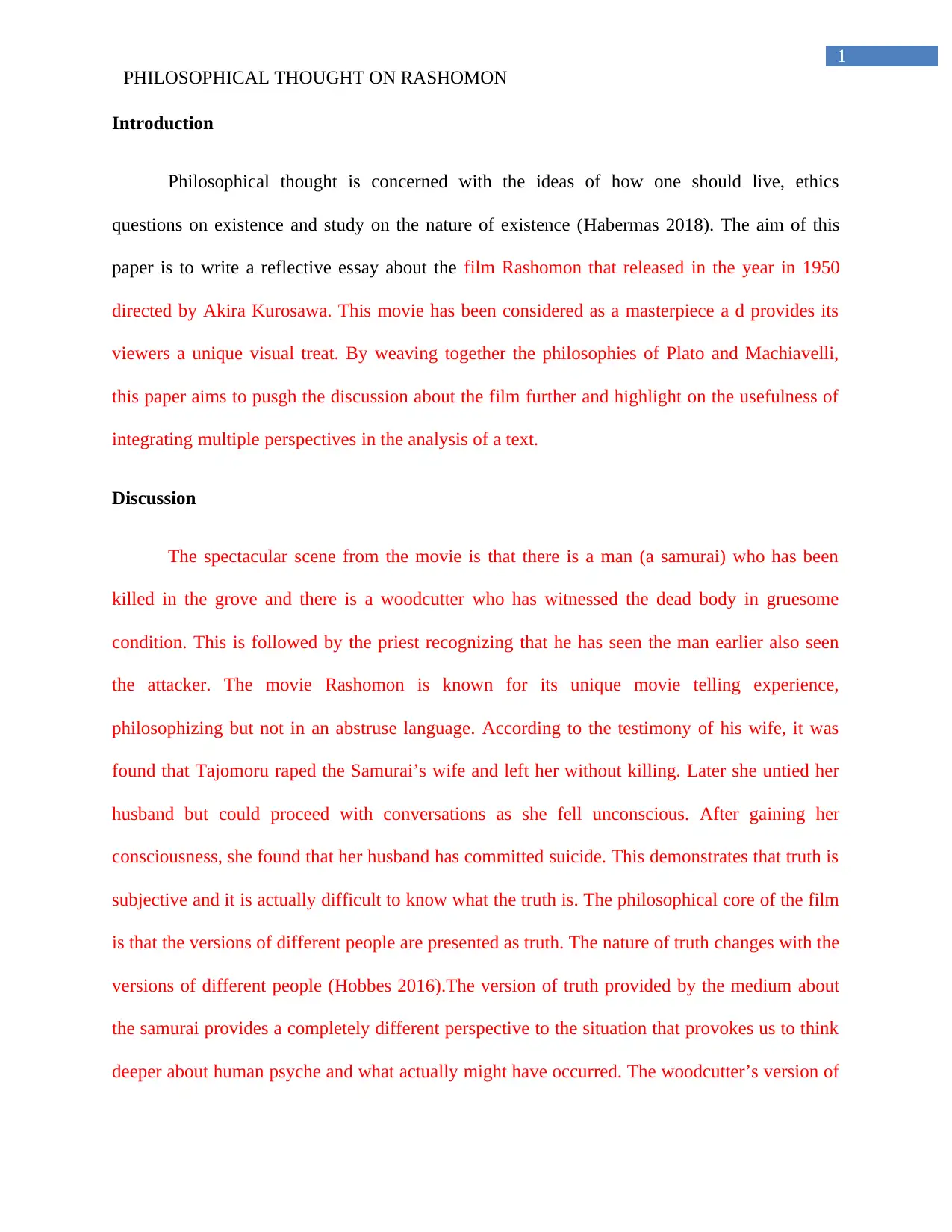
1
PHILOSOPHICAL THOUGHT ON RASHOMON
Introduction
Philosophical thought is concerned with the ideas of how one should live, ethics
questions on existence and study on the nature of existence (Habermas 2018). The aim of this
paper is to write a reflective essay about the film Rashomon that released in the year in 1950
directed by Akira Kurosawa. This movie has been considered as a masterpiece a d provides its
viewers a unique visual treat. By weaving together the philosophies of Plato and Machiavelli,
this paper aims to pusgh the discussion about the film further and highlight on the usefulness of
integrating multiple perspectives in the analysis of a text.
Discussion
The spectacular scene from the movie is that there is a man (a samurai) who has been
killed in the grove and there is a woodcutter who has witnessed the dead body in gruesome
condition. This is followed by the priest recognizing that he has seen the man earlier also seen
the attacker. The movie Rashomon is known for its unique movie telling experience,
philosophizing but not in an abstruse language. According to the testimony of his wife, it was
found that Tajomoru raped the Samurai’s wife and left her without killing. Later she untied her
husband but could proceed with conversations as she fell unconscious. After gaining her
consciousness, she found that her husband has committed suicide. This demonstrates that truth is
subjective and it is actually difficult to know what the truth is. The philosophical core of the film
is that the versions of different people are presented as truth. The nature of truth changes with the
versions of different people (Hobbes 2016).The version of truth provided by the medium about
the samurai provides a completely different perspective to the situation that provokes us to think
deeper about human psyche and what actually might have occurred. The woodcutter’s version of
PHILOSOPHICAL THOUGHT ON RASHOMON
Introduction
Philosophical thought is concerned with the ideas of how one should live, ethics
questions on existence and study on the nature of existence (Habermas 2018). The aim of this
paper is to write a reflective essay about the film Rashomon that released in the year in 1950
directed by Akira Kurosawa. This movie has been considered as a masterpiece a d provides its
viewers a unique visual treat. By weaving together the philosophies of Plato and Machiavelli,
this paper aims to pusgh the discussion about the film further and highlight on the usefulness of
integrating multiple perspectives in the analysis of a text.
Discussion
The spectacular scene from the movie is that there is a man (a samurai) who has been
killed in the grove and there is a woodcutter who has witnessed the dead body in gruesome
condition. This is followed by the priest recognizing that he has seen the man earlier also seen
the attacker. The movie Rashomon is known for its unique movie telling experience,
philosophizing but not in an abstruse language. According to the testimony of his wife, it was
found that Tajomoru raped the Samurai’s wife and left her without killing. Later she untied her
husband but could proceed with conversations as she fell unconscious. After gaining her
consciousness, she found that her husband has committed suicide. This demonstrates that truth is
subjective and it is actually difficult to know what the truth is. The philosophical core of the film
is that the versions of different people are presented as truth. The nature of truth changes with the
versions of different people (Hobbes 2016).The version of truth provided by the medium about
the samurai provides a completely different perspective to the situation that provokes us to think
deeper about human psyche and what actually might have occurred. The woodcutter’s version of
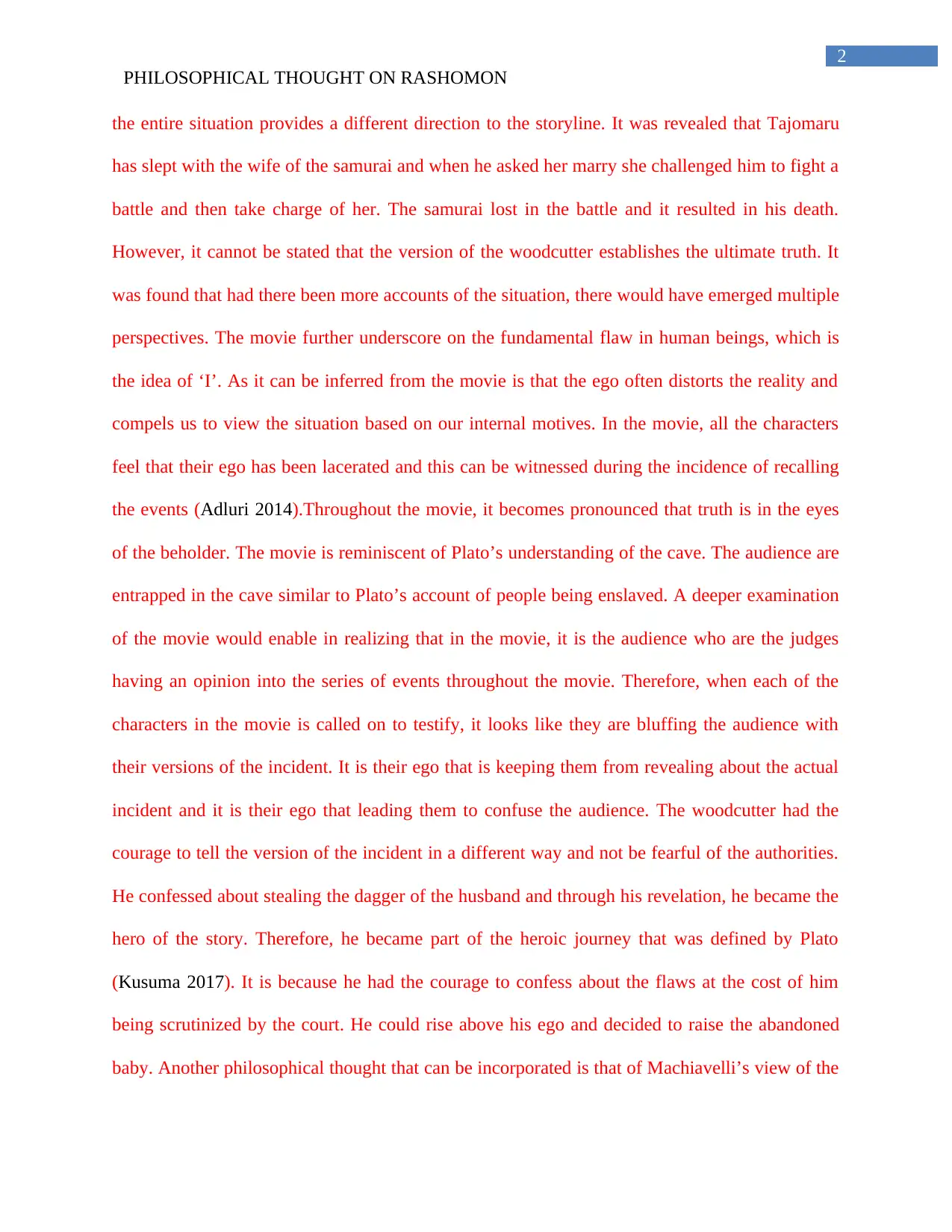
2
PHILOSOPHICAL THOUGHT ON RASHOMON
the entire situation provides a different direction to the storyline. It was revealed that Tajomaru
has slept with the wife of the samurai and when he asked her marry she challenged him to fight a
battle and then take charge of her. The samurai lost in the battle and it resulted in his death.
However, it cannot be stated that the version of the woodcutter establishes the ultimate truth. It
was found that had there been more accounts of the situation, there would have emerged multiple
perspectives. The movie further underscore on the fundamental flaw in human beings, which is
the idea of ‘I’. As it can be inferred from the movie is that the ego often distorts the reality and
compels us to view the situation based on our internal motives. In the movie, all the characters
feel that their ego has been lacerated and this can be witnessed during the incidence of recalling
the events (Adluri 2014).Throughout the movie, it becomes pronounced that truth is in the eyes
of the beholder. The movie is reminiscent of Plato’s understanding of the cave. The audience are
entrapped in the cave similar to Plato’s account of people being enslaved. A deeper examination
of the movie would enable in realizing that in the movie, it is the audience who are the judges
having an opinion into the series of events throughout the movie. Therefore, when each of the
characters in the movie is called on to testify, it looks like they are bluffing the audience with
their versions of the incident. It is their ego that is keeping them from revealing about the actual
incident and it is their ego that leading them to confuse the audience. The woodcutter had the
courage to tell the version of the incident in a different way and not be fearful of the authorities.
He confessed about stealing the dagger of the husband and through his revelation, he became the
hero of the story. Therefore, he became part of the heroic journey that was defined by Plato
(Kusuma 2017). It is because he had the courage to confess about the flaws at the cost of him
being scrutinized by the court. He could rise above his ego and decided to raise the abandoned
baby. Another philosophical thought that can be incorporated is that of Machiavelli’s view of the
PHILOSOPHICAL THOUGHT ON RASHOMON
the entire situation provides a different direction to the storyline. It was revealed that Tajomaru
has slept with the wife of the samurai and when he asked her marry she challenged him to fight a
battle and then take charge of her. The samurai lost in the battle and it resulted in his death.
However, it cannot be stated that the version of the woodcutter establishes the ultimate truth. It
was found that had there been more accounts of the situation, there would have emerged multiple
perspectives. The movie further underscore on the fundamental flaw in human beings, which is
the idea of ‘I’. As it can be inferred from the movie is that the ego often distorts the reality and
compels us to view the situation based on our internal motives. In the movie, all the characters
feel that their ego has been lacerated and this can be witnessed during the incidence of recalling
the events (Adluri 2014).Throughout the movie, it becomes pronounced that truth is in the eyes
of the beholder. The movie is reminiscent of Plato’s understanding of the cave. The audience are
entrapped in the cave similar to Plato’s account of people being enslaved. A deeper examination
of the movie would enable in realizing that in the movie, it is the audience who are the judges
having an opinion into the series of events throughout the movie. Therefore, when each of the
characters in the movie is called on to testify, it looks like they are bluffing the audience with
their versions of the incident. It is their ego that is keeping them from revealing about the actual
incident and it is their ego that leading them to confuse the audience. The woodcutter had the
courage to tell the version of the incident in a different way and not be fearful of the authorities.
He confessed about stealing the dagger of the husband and through his revelation, he became the
hero of the story. Therefore, he became part of the heroic journey that was defined by Plato
(Kusuma 2017). It is because he had the courage to confess about the flaws at the cost of him
being scrutinized by the court. He could rise above his ego and decided to raise the abandoned
baby. Another philosophical thought that can be incorporated is that of Machiavelli’s view of the
⊘ This is a preview!⊘
Do you want full access?
Subscribe today to unlock all pages.

Trusted by 1+ million students worldwide
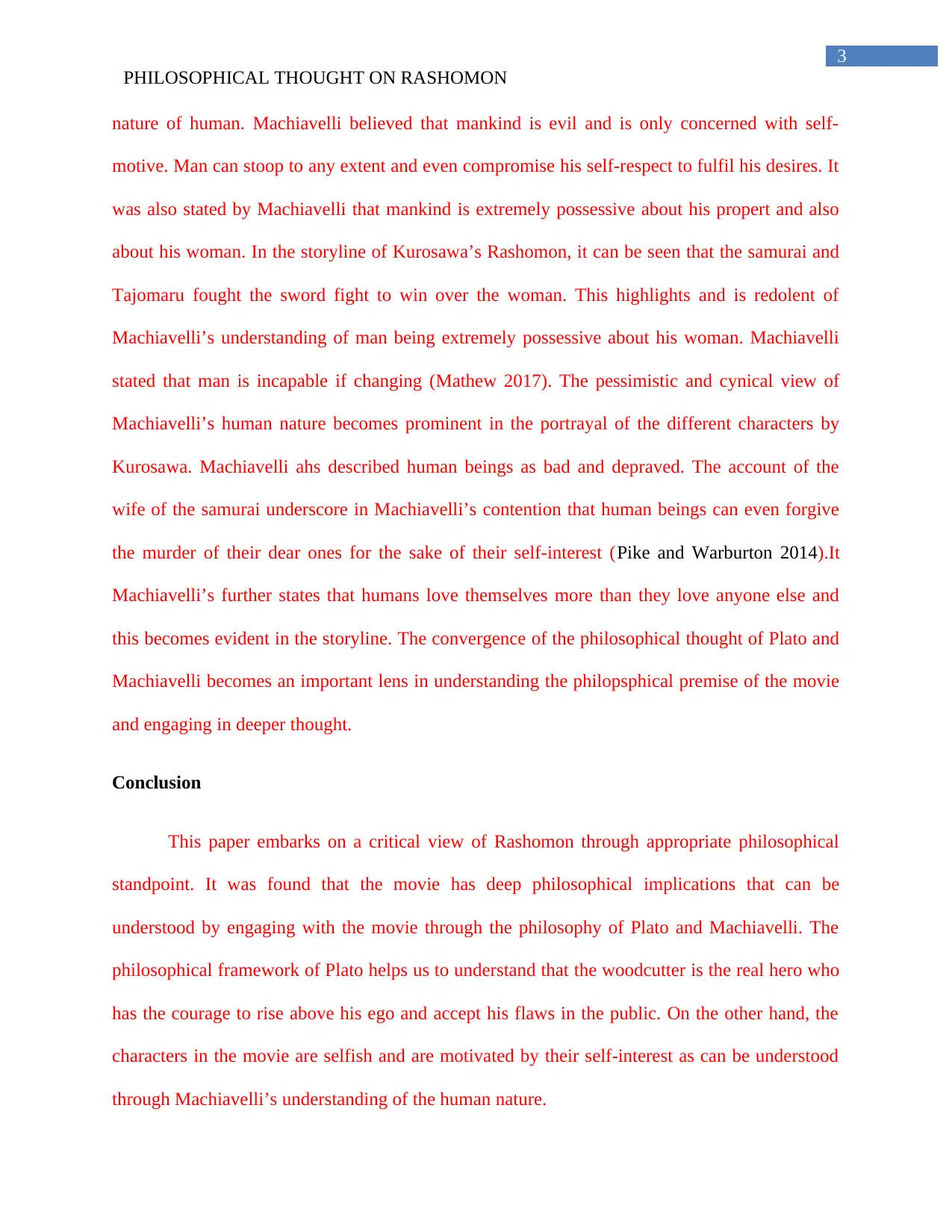
3
PHILOSOPHICAL THOUGHT ON RASHOMON
nature of human. Machiavelli believed that mankind is evil and is only concerned with self-
motive. Man can stoop to any extent and even compromise his self-respect to fulfil his desires. It
was also stated by Machiavelli that mankind is extremely possessive about his propert and also
about his woman. In the storyline of Kurosawa’s Rashomon, it can be seen that the samurai and
Tajomaru fought the sword fight to win over the woman. This highlights and is redolent of
Machiavelli’s understanding of man being extremely possessive about his woman. Machiavelli
stated that man is incapable if changing (Mathew 2017). The pessimistic and cynical view of
Machiavelli’s human nature becomes prominent in the portrayal of the different characters by
Kurosawa. Machiavelli ahs described human beings as bad and depraved. The account of the
wife of the samurai underscore in Machiavelli’s contention that human beings can even forgive
the murder of their dear ones for the sake of their self-interest (Pike and Warburton 2014).It
Machiavelli’s further states that humans love themselves more than they love anyone else and
this becomes evident in the storyline. The convergence of the philosophical thought of Plato and
Machiavelli becomes an important lens in understanding the philopsphical premise of the movie
and engaging in deeper thought.
Conclusion
This paper embarks on a critical view of Rashomon through appropriate philosophical
standpoint. It was found that the movie has deep philosophical implications that can be
understood by engaging with the movie through the philosophy of Plato and Machiavelli. The
philosophical framework of Plato helps us to understand that the woodcutter is the real hero who
has the courage to rise above his ego and accept his flaws in the public. On the other hand, the
characters in the movie are selfish and are motivated by their self-interest as can be understood
through Machiavelli’s understanding of the human nature.
PHILOSOPHICAL THOUGHT ON RASHOMON
nature of human. Machiavelli believed that mankind is evil and is only concerned with self-
motive. Man can stoop to any extent and even compromise his self-respect to fulfil his desires. It
was also stated by Machiavelli that mankind is extremely possessive about his propert and also
about his woman. In the storyline of Kurosawa’s Rashomon, it can be seen that the samurai and
Tajomaru fought the sword fight to win over the woman. This highlights and is redolent of
Machiavelli’s understanding of man being extremely possessive about his woman. Machiavelli
stated that man is incapable if changing (Mathew 2017). The pessimistic and cynical view of
Machiavelli’s human nature becomes prominent in the portrayal of the different characters by
Kurosawa. Machiavelli ahs described human beings as bad and depraved. The account of the
wife of the samurai underscore in Machiavelli’s contention that human beings can even forgive
the murder of their dear ones for the sake of their self-interest (Pike and Warburton 2014).It
Machiavelli’s further states that humans love themselves more than they love anyone else and
this becomes evident in the storyline. The convergence of the philosophical thought of Plato and
Machiavelli becomes an important lens in understanding the philopsphical premise of the movie
and engaging in deeper thought.
Conclusion
This paper embarks on a critical view of Rashomon through appropriate philosophical
standpoint. It was found that the movie has deep philosophical implications that can be
understood by engaging with the movie through the philosophy of Plato and Machiavelli. The
philosophical framework of Plato helps us to understand that the woodcutter is the real hero who
has the courage to rise above his ego and accept his flaws in the public. On the other hand, the
characters in the movie are selfish and are motivated by their self-interest as can be understood
through Machiavelli’s understanding of the human nature.
Paraphrase This Document
Need a fresh take? Get an instant paraphrase of this document with our AI Paraphraser
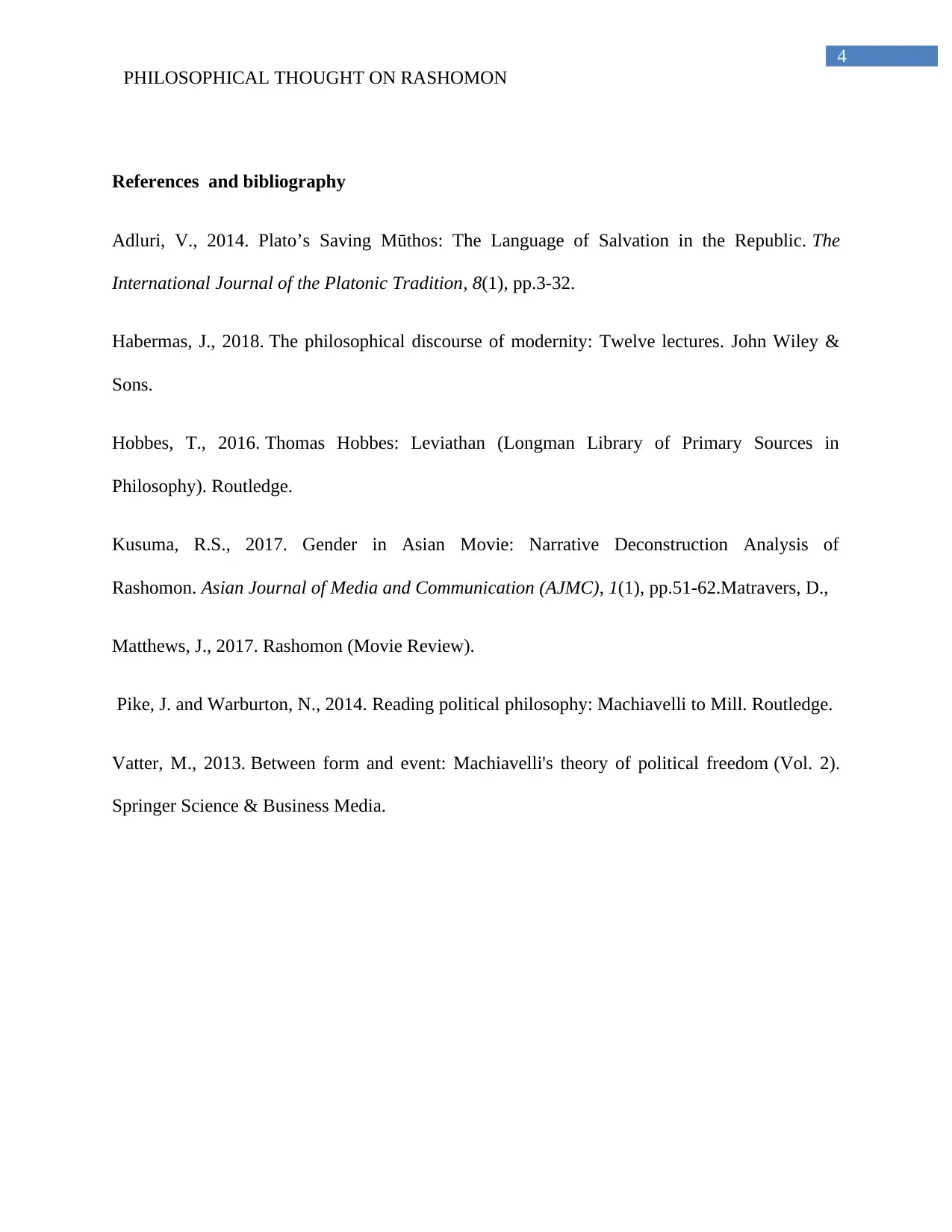
4
PHILOSOPHICAL THOUGHT ON RASHOMON
References and bibliography
Adluri, V., 2014. Plato’s Saving Mūthos: The Language of Salvation in the Republic. The
International Journal of the Platonic Tradition, 8(1), pp.3-32.
Habermas, J., 2018. The philosophical discourse of modernity: Twelve lectures. John Wiley &
Sons.
Hobbes, T., 2016. Thomas Hobbes: Leviathan (Longman Library of Primary Sources in
Philosophy). Routledge.
Kusuma, R.S., 2017. Gender in Asian Movie: Narrative Deconstruction Analysis of
Rashomon. Asian Journal of Media and Communication (AJMC), 1(1), pp.51-62.Matravers, D.,
Matthews, J., 2017. Rashomon (Movie Review).
Pike, J. and Warburton, N., 2014. Reading political philosophy: Machiavelli to Mill. Routledge.
Vatter, M., 2013. Between form and event: Machiavelli's theory of political freedom (Vol. 2).
Springer Science & Business Media.
PHILOSOPHICAL THOUGHT ON RASHOMON
References and bibliography
Adluri, V., 2014. Plato’s Saving Mūthos: The Language of Salvation in the Republic. The
International Journal of the Platonic Tradition, 8(1), pp.3-32.
Habermas, J., 2018. The philosophical discourse of modernity: Twelve lectures. John Wiley &
Sons.
Hobbes, T., 2016. Thomas Hobbes: Leviathan (Longman Library of Primary Sources in
Philosophy). Routledge.
Kusuma, R.S., 2017. Gender in Asian Movie: Narrative Deconstruction Analysis of
Rashomon. Asian Journal of Media and Communication (AJMC), 1(1), pp.51-62.Matravers, D.,
Matthews, J., 2017. Rashomon (Movie Review).
Pike, J. and Warburton, N., 2014. Reading political philosophy: Machiavelli to Mill. Routledge.
Vatter, M., 2013. Between form and event: Machiavelli's theory of political freedom (Vol. 2).
Springer Science & Business Media.
1 out of 5
Your All-in-One AI-Powered Toolkit for Academic Success.
+13062052269
info@desklib.com
Available 24*7 on WhatsApp / Email
![[object Object]](/_next/static/media/star-bottom.7253800d.svg)
Unlock your academic potential
Copyright © 2020–2026 A2Z Services. All Rights Reserved. Developed and managed by ZUCOL.
